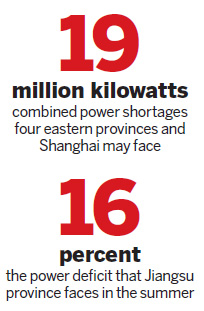Energy
Energy crunch looming
By Wang Zhenghua, and Li Sixiao (China Daily)
Updated: 2011-05-17 09:16
 |
Large Medium Small |
Surging demand and drought blamed for severe power shortages
SHANGHAI - Power shortages that gripped many parts of the country in recent months could herald the worst energy crunch in years amid growing concerns that economic growth may suffer.
Power cuts and blackouts since March, due to price controls, surging demand and a drop in hydropower production because of drought, have hit businesses in coastal areas and some inland provinces.
According to estimates by regional power distributor East China Grid Co Ltd, the provinces of Jiangsu, Zhejiang, Fujian and Anhui and the financial hub of Shanghai may face combined power shortages of up to 19 million kilowatts (kW) in the summer.
| ||||
Power shortages are also due to the push to transform the economic development pattern by encouraging investment in emerging industries, such as new energy, Xinhua News Agency said.
Thermal power previously accounted for 75 percent of China's total installed power capacity and 82 percent of the country's generating capacity. But investment in the sector dropped to 130 billion yuan ($20 billion) last year from 200 billion yuan five years ago, Yu Yanshan, deputy director of the office of the State Electricity Regulatory Commission, said. 
The China Electricity Council predicts a decline in the growth rate of installed power capacity over the next three years.
Xue Jing, director of the council's statistics department, said the recent drop in investment in the thermal power sector dragged down electricity supplies.
Meanwhile, coal-fueled power plants are reluctant to boost production amid rising coal prices.
Power shortages are exacerbating the plight of many small and medium-sized enterprises in the delta regions of the Yangtze and Pearl rivers, adding to the existing difficulties of financing and rising production costs.
The power crunch is partly caused by the resurgence of high energy-consuming industries as local governments, trying to pursue robust growth, ignore Beijing's decision to shut down outdated production capacity, Yang Jianhua, research head at the Zhejiang Academy of Social Sciences, said on Monday.
Fang Sihai, chief economist at Hongyuan Securities, agreed.
"The country has yet to properly transfer its economic growth pattern and there is a resurgence of energy-hungry industries."
Economists said shortages could slow growth in heavy industry and alter quarterly growth trajectories in the coming months, though the risk of a severe shortage leading to a sharp slowdown is small.
"At the moment, we do not see power shortages becoming a serious constraint to overall economic growth this year," said Wang Tao, chief economist at UBS Securities.
"In the short term, however, power shortages and cuts in some provinces will slow growth in some heavy industry, including the cement, non-ferrous metal, iron, steel, and chemical sectors."
The power shortage is expected to be the worst since 2004, when coal transport and power generation could not keep pace with demand fueled by the rapid expansion of heavy industry and power rationing hit almost every business and home in China.
In Zhejiang, another major economic powerhouse, many businesses have been forced to cease production for 24 hours every three days or suspend production two days a week to conserve energy.
Other provinces including Hunan, Guangdong and Jiangxi also experienced similar shortages.
The power crunch is hurting small and medium-sized enterprises, with many in eastern and southern parts of the country forced to shut down or suspend production temporarily, the Shanghai-based newspaper Wen Hui Bao said on Monday, citing a report by the All-China Federation of Industry and Commerce.
The report compared the situation with the crisis that gripped many small firms in the 2008 global economic meltdown.
"The worst (power shortage) has yet to come," Xu Shuhui, deputy general manager of Cixi Henghui Chemical Fiber Co in Zhejiang province, said on Monday.
His business, along with many others in the region, has been hit by power shortages since March.
"The power company told us to prepare for even more serious electricity cuts when the high energy-consuming summer months come," Xu said.
Even the largest companies have not been spared in the power crunch. Shanghai's power authority has decided to impose electricity rationing on the Shanghai production site of Baosteel Group Corp, China's largest steelmaker, between June and September.
| 分享按鈕 |



